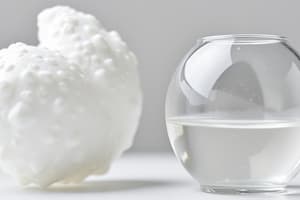Podcast
Questions and Answers
Which branch of chemistry focuses on the study of carbon-containing compounds?
Which branch of chemistry focuses on the study of carbon-containing compounds?
- Inorganic Chemistry
- Organic Chemistry (correct)
- Physical Chemistry
- Analytical Chemistry
What state of matter is characterized by particles that are packed closely and do not move freely?
What state of matter is characterized by particles that are packed closely and do not move freely?
- Gas
- Plasma
- Solid (correct)
- Liquid
In which state of matter do particles move past each other yet remain close together?
In which state of matter do particles move past each other yet remain close together?
- Gas
- Crystalline Solid
- Solid
- Liquid (correct)
Which of the following processes is a phase change from gas to liquid?
Which of the following processes is a phase change from gas to liquid?
Which type of mixture has a uniform composition throughout?
Which type of mixture has a uniform composition throughout?
What technique is used to separate a solid from a liquid?
What technique is used to separate a solid from a liquid?
What is the primary characteristic of gases compared to solids and liquids?
What is the primary characteristic of gases compared to solids and liquids?
Which of the following is not considered matter?
Which of the following is not considered matter?
When a solid turns directly into a gas, this process is known as:
When a solid turns directly into a gas, this process is known as:
Flashcards are hidden until you start studying
Study Notes
Chemistry Overview
- Chemistry investigates matter and its transformations.
- Comprised of five major branches:
- Organic: Carbon-containing compounds.
- Inorganic: Compounds not primarily based on carbon.
- Analytical: Measurement of material properties.
- Physical: Intersection of physics and chemical principles.
- Biochemistry: Chemical processes within living organisms.
Understanding Matter
- Matter is defined as anything with mass and volume.
- Composed of atoms; examples include protons, currency, and flowers.
- Non-examples include intangible entities like light and heat.
States of Matter
- Solid:
- Particles arranged in a fixed, orderly pattern; closely packed.
- High density, incompressible, fixed shape, and incapable of flowing.
- Liquid:
- Particles closely packed but with a random arrangement; can move past one another.
- Shape can change, volume remains constant, and can flow easily despite being incompressible.
- Gas:
- Particles are widely spaced and move freely in various directions.
- Low density, easily compressible, and expand to fill the entire container.
Classification of Matter
- Divided into:
- Pure Substances: Elements or compounds.
- Mixtures: Homogeneous (uniform composition) or heterogeneous (distinct, separate components).
Changes of State
- Transitions between states of matter include:
- Melting: Solid to Liquid.
- Freezing: Liquid to Solid.
- Evaporation/Boiling: Liquid to Gas.
- Condensation: Gas to Liquid.
- Sublimation: Solid to Gas.
- Deposition: Gas to Solid.
Separation Techniques
- Filtration: Separating solid from liquid using a filter.
- Crystallization: Formation of pure solid particles from a solution.
- Simple Distillation: Separation based on boiling points by heating a mixture.
Studying That Suits You
Use AI to generate personalized quizzes and flashcards to suit your learning preferences.




